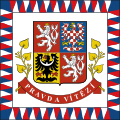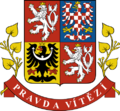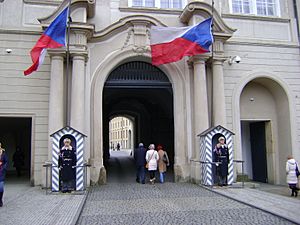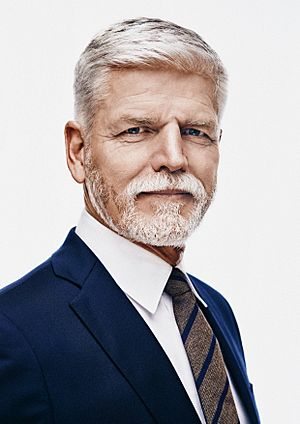President of the Czech Republic facts for kids
Quick facts for kids President of the Czech Republic |
|
|---|---|

|
|

Presidential version of coat of arms with the motto used on Czech Presidential Flag
|
|
|
|
| Style |
|
| Residence | Prague Castle |
| Seat | Prague, Czech Republic |
| Appointer | Popular vote |
| Term length | Five years,
renewable once consecutively
|
| Constituting instrument | Constitution of the Czech Republic (1992) |
| Precursor | President of Czechoslovakia |
| Formation | 2 February 1993 |
| First holder | Václav Havel |
| Succession | Line of succession |
| Salary | 341,200 Kč per month |
The President of the Czech Republic is the head of state for the Czech Republic. This person is also the commander-in-chief of the country's armed forces.
The role of president was first shaped by Tomáš Garrigue Masaryk in 1918. He was the first president after Czechoslovakia became independent. The 1920 Constitution gave the president a lot of power. Masaryk's popularity meant the presidency had a big impact on public life.
Today, the president is mostly a ceremonial figure with limited powers. The daily work of the government is handled by the prime minister. Many of the president's actions need the prime minister's approval. Even so, the presidency is seen as a very important role. It brings moral authority and prestige both inside the country and with other nations. The president works from Prague Castle.
The Czech Constitution says the president cannot be held responsible for their actions. The only exceptions are for treason or serious violations of the Constitution. The Parliament is the only body that can start an impeachment process. The president can only be removed from office after a trial by the Constitutional Court.
The president is responsible for choosing the prime minister and other government ministers. They also appoint members of the Czech National Bank board. The president nominates judges for the Constitutional Court. These judges need Senate approval. The president can also grant pardons, reduce criminal sentences, and issue amnesties. They have a veto power over laws. This veto can be overturned by a majority vote in the Chamber of Deputies.
The president is elected directly by the people. This happens using a two-round system for a five-year term. Before 2013, the president was chosen by Parliament. According to the Constitution, a person can only be elected president twice in a row. The current president, Petr Pavel, was elected in the 2023 election. He started his term on March 9, 2023.
Contents
President's Powers
The people who wrote the Constitution of the Czech Republic wanted a system where the prime minister was the main political leader. The president was meant to be a ceremonial head of state. However, the first president, Václav Havel, was so respected that the office gained more influence.
Special Powers of the President
The president of the Czech Republic can act on their own in some important areas. One of their strongest powers is the veto. This means they can send a bill back to Parliament. Parliament can overturn the veto with a majority vote from all its members. But the veto still acts as a way to check Parliament's power. The president cannot veto laws that would change the Constitution.
The president also plays a key role in appointing people to high positions. This includes judges for the Supreme and Constitutional Courts. These appointments need the Senate's permission. They also appoint members of the Bank Board for the Czech National Bank.
When the President Can Act Alone
Some powers are only for the president, but they can only be used in certain situations. The most important of these is dissolving the Chamber of Deputies. If the president dissolves the Chamber, a new election must happen within 60 days. This can only be done under specific rules set by the Constitution.
Many of the president's powers can only be used with the government's approval. This approval is shown by the prime minister's signature. These shared powers include everything about foreign relations and using the military. They also include appointing judges to lower courts and granting amnesty. The president can call for elections to the Chamber and Senate only with the prime minister's approval. This is not needed if the Chamber of Deputies was dissolved because it couldn't form a government.
The president also shares responsibility with the Chamber of Deputies for appointing leaders of the Supreme Control Office. This office manages the national budget. This appointment does not strictly need the prime minister's signature.
Immunity from Prosecution
The president cannot be put on trial or arrested for any crime or administrative offense while in office. The only exception is for high treason. Only the Senate can bring charges for high treason. If found guilty, the president can only be removed from office and banned from holding the position again.
Ceremonial Duties
Many of the Czech president's duties are ceremonial. This is because the president has few powers without the prime minister's approval. For example, the president is the commander in chief of the military. But they cannot do anything with this role without the prime minister's approval. In matters of war, the president is mostly a figurehead. The Constitution gives all real power over the military to Parliament. The only specific thing the president can do for the military is appoint generals. Even this needs the prime minister's signature.
Many ceremonial duties fall under parts of the Constitution that allow powers "not explicitly defined." This means Parliament can give the president other responsibilities without changing the Constitution. For example, a law in 1994 allowed the president to award state decorations on their own. Before this, it needed the prime minister's signature. So, this duty is now shared between Parliament and the president.
Presidential Elections
Until 2012, the president was chosen by an indirect election by the Parliament of the Czech Republic. In February 2012, a change was made to allow a direct election by the people. This change became law on October 1, 2012.
How Elections Work Now
The president serves a term of five years. A new president starts their term on the day they take their official oath. Candidates must be at least 40 years old. They cannot have been elected president twice in a row before. This means someone could be president more than twice, but not consecutively.
To become a candidate, a person must get signatures from 50,000 citizens. Or, they can be nominated by 20 members of the Chamber of Deputies or 10 senators.
The Constitution does not set a specific election date. It says elections must happen between 30 and 60 days before the current president's term ends. The election must be announced at least 90 days beforehand. If a president dies, resigns, or is removed, an election can be held quickly. If no candidate wins a majority of votes, a second round of voting happens between the top two candidates.
If a new president is not elected by the end of the current president's term, or if the position is empty for 30 days, some duties go to the prime minister. Other duties go to the chairman of the Chamber of Deputies. If Parliament is dissolved, these duties go to the chairman of the Senate.
The first direct presidential election in the Czech Republic took place in January 2013.
Leaving Office
Besides death, there are only three ways a president can leave office:
- A president can resign by telling the President of the Senate.
- The Senate and Chamber of Deputies can decide together that the president cannot do their job for "serious reasons." The president can ask the Constitutional Court to overturn this decision.
- The Senate can accuse the president of high treason. If the Constitutional Court finds them guilty, they are removed from office.
Who Takes Over?
If the president cannot do their duties, or if the position becomes empty, the duties are split. They are shared between the President of the Chamber of Deputies and the Prime Minister. If the Chamber of Deputies is dissolved at that time, the duties that usually go to its President go to the President of the Senate. The Senate President also takes on the responsibility of calling elections for the Chamber.
Symbols of the Office
Presidential Fanfare
Since the first Czechoslovak president, Tomáš Garrigue Masaryk, the presidential fanfare has been a special piece of music. It is the introduction to Bedřich Smetana's opera Libuše. This music is a symbol of Czech patriotism.
Official Symbols
The president's office has special symbols, set by laws passed by Parliament. The most visible is the president's flag, shown at the top right of this page. The president's official motto is the same as the country's: "Pravda vítězí" ("Truth prevails").
The president is also in charge of Prague Castle. This means they control the symbols related to the castle. This includes the special uniforms worn by the Castle Guard. This is a special military unit that works directly for the president.
While in office, the president can wear the highest honors of the country's two ceremonial orders. These are the Order of the White Lion and the Order of Tomáš Garrigue Masaryk. When a president starts their term, they automatically become the highest holder and leader of both orders. By tradition, Parliament allows a president who leaves office to remain a lifelong member of these orders. The decorations return to the state after the former president's death.
Presidential Homes

The official home of the president of the Czech Republic is Prague Castle. However, the living areas there are small. Because of this, recent presidents like Václav Havel, Václav Klaus, and Miloš Zeman have chosen to live elsewhere. The president also has a summer home at a castle in the village of Lány. This village is about 35 kilometers west of Prague.
List of Presidents
See also
 In Spanish: Presidente de la República Checa para niños
In Spanish: Presidente de la República Checa para niños
- Prime Minister of the Czech Republic
- List of prime ministers of the Czech Republic
- List of presidents of Czechoslovakia
- List of Czech presidential candidates
 | Emma Amos |
 | Edward Mitchell Bannister |
 | Larry D. Alexander |
 | Ernie Barnes |


